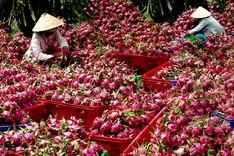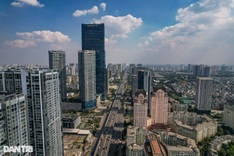
The consumer price index in the first 9 months of this year increased by 3.27 per cent compared to the same period last year. Photo baochinhphu.vn
Vietnam is expected to keep inflation below 4 per cent in 2025, in line with government targets, but experts have warned that surging asset prices could fuel expectations of higher inflation and place pressure on overall prices.
According to the General Statistics Office (GSO), the consumer price index (CPI) in September 2025 rose 2.61 per cent compared with December 2024, and 3.38 per cent year on year. On average, CPI in the first nine months of 2025 increased by 3.27 per cent compared with the same period last year.
Dr Nguyen Quoc Viet, a public policy expert at the University of Economics under Vietnam National University, forecast that the country would meet the inflation target set by the National Assembly and the Government.
However, he warned of potential risks from speculative sectors such as real estate, gold, silver, and certain rare raw materials, saying these could trigger “expected inflation” and increase overall price pressures.
Exchange rate volatility and the early-year depreciation of the Vietnamese dong have also heightened concerns by pushing up the cost of imported goods and raw materials.
“Macroeconomic management must continue to closely monitor asset price movements to prevent expected inflation from turning into actual inflation,” Viet said, adding that maintaining a balance between stability and growth is crucial, particularly in sensitive areas of the economy.
Nguyen Thu Oanh, Head of the GSO’s Services and Prices Department, echoed these concerns, noting that inflationary pressure remains in the final months of the year.
Key risks, she said, include prolonged geopolitical tensions, rising trade protectionism, and new US tax policies, all of which could influence global inflation and spill over into Vietnam. Seasonal factors could also drive up prices of food, garments, and construction materials toward the year-end and during the Lunar New Year period, while natural disasters and flooding could lift local commodity prices.
Real estate prices have surged sharply, with housing costs and rents increasing about 2.2 times faster than the overall CPI, exerting a significant impact on inflation. Rising production, consumption, and public investment towards the end of the year could further add to price pressure.
Despite these risks, Oanh expected inflation in 2025 to stay within the 4.5-5 per cent range set by the National Assembly, supported by the Government’s proactive and experienced price management.
“If fiscal and monetary policies continue to be implemented consistently, flexibly, and proactively in response to global fluctuations, inflation in 2025 is likely to remain within the target while supporting sustainable economic growth,” she said.
Dr Nguyen Thuong Lang, a lecturer at the Institute of International Trade and Economics under the National Economics University, said moderate interest rate adjustments could help reduce money supply in the market, easing inflationary pressure.
He noted that a certain level of inflation is necessary during economic transition to sustain growth momentum, and that monetary policy, particularly interest rate management, must remain flexible to avoid market shocks.
Lang also highlighted the importance of directing investment capital into high-tech and innovative sectors to raise productivity and value-added output, which would support inflation control. He said stimulating consumption and promoting trade diversification, focusing on key industries, and adjusting the economic structure appropriately are also crucial for price stability and sustainable growth.
“When capital flows, goods, and consumer demand are properly regulated, the economy will become more stable and inflation will be controlled naturally,” Lang said.




















